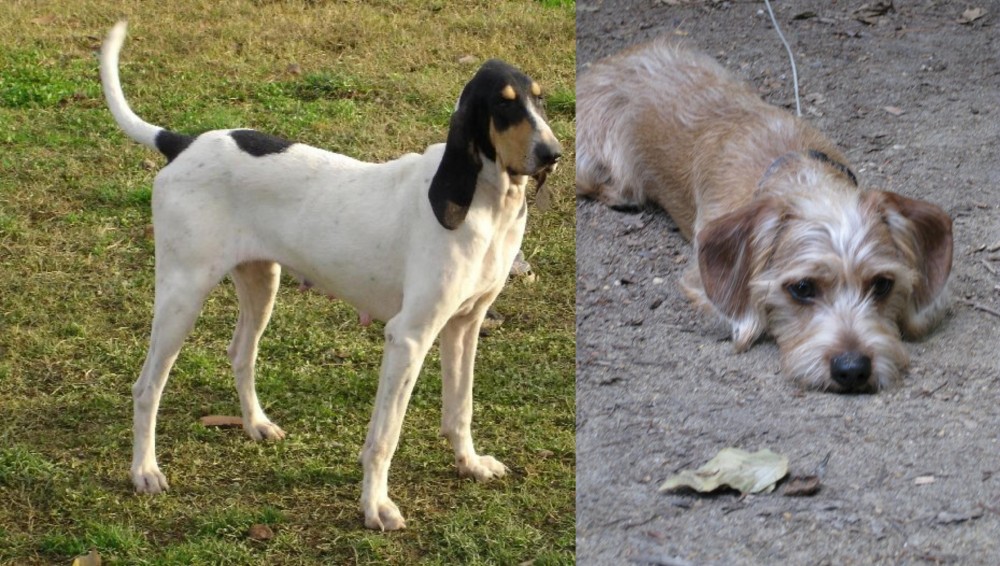 Petzlover
Petzlover Petit Gascon Saintongeois is originated from France but Schweenie is originated from United Kingdom. Petit Gascon Saintongeois may grow 12 cm / 5 inches higher than Schweenie. Petit Gascon Saintongeois may weigh 18 kg / 40 pounds more than Schweenie. Both Petit Gascon Saintongeois and Schweenie has same life span. Petit Gascon Saintongeois may have more litter size than Schweenie. Both Petit Gascon Saintongeois and Schweenie requires Low Maintenance.
Petit Gascon Saintongeois is originated from France but Schweenie is originated from United Kingdom. Petit Gascon Saintongeois may grow 12 cm / 5 inches higher than Schweenie. Petit Gascon Saintongeois may weigh 18 kg / 40 pounds more than Schweenie. Both Petit Gascon Saintongeois and Schweenie has same life span. Petit Gascon Saintongeois may have more litter size than Schweenie. Both Petit Gascon Saintongeois and Schweenie requires Low Maintenance.
 The Petit Gascon Saintongeois comes from- and is in fact a smaller version of the Grand Gascon Saintongeois. The dog has been used for hunting. Hunters wanted a smaller dog and these were the Petit Gascon Saintongeois.
The Petit Gascon Saintongeois comes from- and is in fact a smaller version of the Grand Gascon Saintongeois. The dog has been used for hunting. Hunters wanted a smaller dog and these were the Petit Gascon Saintongeois.
There was a time when the numbers of these dogs became less and their numbers were restored by Baron Virelade in the 19th century. It is where this dog gets his nickname from.
The Petit Gascon-Saintongeois was recognized by the United Kennel Club on January 1, 1993.
 The Schweenie is a hybrid dog, with the parent breeds being the Shih Tzu and the Dachshund.
The Schweenie is a hybrid dog, with the parent breeds being the Shih Tzu and the Dachshund.
The Schweenie dog has been around for about 4 decades when breeders were looking for a dog that would be free of the health issues of the purebred parent breeds.
Because the Schweenie is a mix breed, it doesn’t qualify to be part of the American Kennel Club. He is however recognized by the Designer Breed Registry and some other clubs.
 The Petit Gascon Saintongeois is a smaller version of the Grand Gascon Saintongeois but he is still muscled and lean and looked upon as being a large, robust dog.
The Petit Gascon Saintongeois is a smaller version of the Grand Gascon Saintongeois but he is still muscled and lean and looked upon as being a large, robust dog.
His coat is short and dense and is white with black patches and some speckles. You'll find that there are nearly always black patches found on either side of the head, surrounding the eyes and covering the ears. The ears are essentially black, although there is also some tan coloring.
The ears are floppy, the tail long and saber-shaped.The Petit Gascon Saintongeois is a well proportioned dog standing at between 56 to 62cm in height and weighing 23 to 27kg.
The Petit Gascon Saintongeois is a friendly, good-natured pet, being loyal and loving with his human family and being a good playmate to children. He is also intelligent and amicable and will be easily trained and socialized.
 The Schweenie will be a smallish dog standing at roughly 27cm to 50cm and weighing 4 – 9kg.
The Schweenie will be a smallish dog standing at roughly 27cm to 50cm and weighing 4 – 9kg.
Because of the Dachshund parent, he will likely have a long body. The coat is shortish to medium length and can be a variety of colors – from a rusty color to brown, black, grey and even a cream shade. The ears are floppy and the tail medium length.
He is a small dog who is smart and bright and who wants to please his human owners. He loves people and wants to be around them and involved in their activities.
Small and cute though he is, he can be a stubborn dog and become a little big aggressive too if he is feeling a bit moody. He will need to be trained and socialized if you want him to obey your simple commands such as sit, stay, lie down and come.
He is intelligent enough to learn these simple commands with ease.He is both alert and vigilant, and this makes them good watchdogs.
 Your gentle, calm, amicable Petit Gascon-Saintongeois is such an excellent hunting dog, but he doesn’t let that get in the way of him being a wonderful family pet as well.
Your gentle, calm, amicable Petit Gascon-Saintongeois is such an excellent hunting dog, but he doesn’t let that get in the way of him being a wonderful family pet as well.
His friendly, good natured, docile temperament makes this particular breed a superb choice as he gets on so well with children too if they themselves have been taught to be kind to animals and to respect them.
He is intelligent too and easy to train, and he is attractive to look at as a bonus. This all makes him the kind of pet and companion that everyone could benefit from.
 The Schweenie can be somewhat reserved and they need exercise regularly as well. If they don’t get enough exercise, they tend to become jittery and this can make them become a bit snappy. The are more prone to be snappy and aggressive with children who haven’t been taught how to treat animals gently and with respect.
The Schweenie can be somewhat reserved and they need exercise regularly as well. If they don’t get enough exercise, they tend to become jittery and this can make them become a bit snappy. The are more prone to be snappy and aggressive with children who haven’t been taught how to treat animals gently and with respect.
They’re small enough to adjust to life in the city or countryside but will still need to be exercised.
The little Schweenie, with the right kind of owner can become a great little pet and companion.
 The Petit Gascon-Saintongeois has no documented breed related health problems. As previously mentioned, with his long ears, check out the inside of his ears regularly for ear infections.
The Petit Gascon-Saintongeois has no documented breed related health problems. As previously mentioned, with his long ears, check out the inside of his ears regularly for ear infections.
Ticks fleas and worms are a curse. Worms particularly are terrible internal parasites and in fact some worms can even be fatal in puppies. Some of the signs your dogs may have worms include weight loss, a dull, dry, thinning coat, no loger interested in food, diarrhea and vomiting. The best way to respond to your pet’s worm issues is to get him to the vet.
This problem is looked upon as a medical emergency. Gastric dilatation and volvulus, if left, can kill your dog. It’s when gas is trapped in the stomach which has twisted, blocking off the stomach’s blood supply.
Deep chested dogs, feeding your dog just one meal a day so that he gobbles it up too quickly, and older, obese dogs are more prone to bloat. Your dog will require immediate veterinary intervention.
 With good care, your Schweenie can live to be 12 to 15 years of age. Every dog, no matter how healthy, can get some of the health problems that plague many dogs.
With good care, your Schweenie can live to be 12 to 15 years of age. Every dog, no matter how healthy, can get some of the health problems that plague many dogs.
This is where the cushions between each vertebra come into contact with the spinal cord. It can result in nerve damage and sometimes even paralysis. Because the Shih Tzu is one of the parent breeds, you will need to be aware of this ailment as these dogs are more susceptible to this disease.
Hypoglycemia is fairly common in small dogs and it is where there is a drop in blood sugar. It can be brought on by stress. It can also be referred to as low blood sugar and it can be deadly. If your pet is hypoglycemic, you will notice a loss in appetite, extreme lethargy, trembling and unusual behavior. You will need to get your Schweenie to the vet immediately for tests and treatment.
 The Gascon Saintongeois is looked upon as being a fairly low maintenance breed. That is because the coat is short and smooth, although the coat does become thicker in the Winter time. He sheds so you will want to brush his coat at least twice a week.
The Gascon Saintongeois is looked upon as being a fairly low maintenance breed. That is because the coat is short and smooth, although the coat does become thicker in the Winter time. He sheds so you will want to brush his coat at least twice a week.
With his long floppy ears, during your brushing session, check inside his ears as dampness, wax and debris can become the ideal breeding spot for bacteria, and ear infections can be the result. Check for redness and possible discharge.
Check his eyes that they are clear and bright.
While brushing him, check for any new, unusual lumps.
Keep his nails well trimmed.
Provide him with a nice warm, dry spot to sleep.
When he’s oudoors, make sure that he has both sun and shade and that his waterbowl is always available.
Make sure that at the first signs of illness you get your pet to the vet.
Feed him only the best quality kibble there is. Occasionally give him some home-made food. Keep this food simple and nutritious. You can’t go wrong with boiled chicken, brown rice or pasta, sweet potatoes, carrots and spinach. You can chop this up and add it to his kibble. Sometimes it can benefit your pet to include some raw meat as well.
If only pet owners would realize that their pets don’t want all those spicy, exotic people foods. They just give a dog a stomach ache and eventually shorten his life. Make sure he always has access to a bowl of cool, fresh water.
 Your Schweenie will need to be brushed at least twice a week to rid him of loose hairs. Because of his floppy ears, you will need to clean them and check for redness. If you don’t like the idea of probing inside the ear, professional groomers or the vet will do it for you.
Your Schweenie will need to be brushed at least twice a week to rid him of loose hairs. Because of his floppy ears, you will need to clean them and check for redness. If you don’t like the idea of probing inside the ear, professional groomers or the vet will do it for you.
Trim his nails if they don’t wear down on their own.
Provide him with a nice dry, warm spot to sleep.
Provide him with nice chewy toys that will keep him occupied.
Exercise him every day. Taking him on walks and playing ball games with him will keep him fit and trim but also help with staving off boredom.
Ensure his vaccines against deadly diseases are up to date. See that he gets to the vet when he appears to be under the weather.
He is a small dog so you have to be careful about how you feed him. You need to feed him a nutrient-rich dry kibble. Read the packaging and buy dog food according to his size, age and activity levels.
Try and include some home-made food into your dogs diet. A little bit of boiled chicken, brown rice or pasta, sweet potatoes, carrots and spinach all chopped up will do him good and can be added into the dry kibble twice a week. Some raw meat should also occasionally be added in as this can help to prevent some skin problems. Be sure that cool, fresh water is available for your pet at all times.